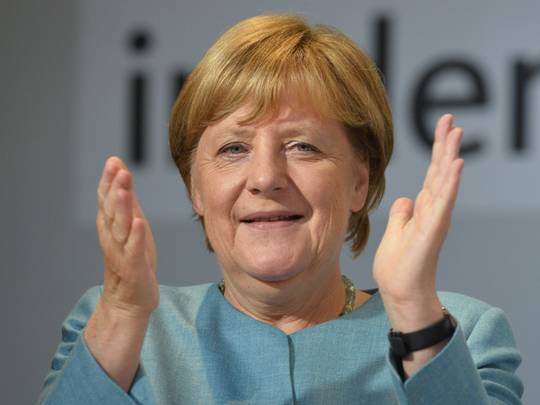
You could never describe German Chancellor Angela Merkel as a fashion icon. With her trademark twin-piece suits, solid but brightly coloured tops combined with white or black trousers, there are no editors of monthly fashion magazines clamouring to use her as their next issue’s cover model or new seasonal trend.
But Merkel is predictable.
Every August, as they have done for the past seven years, Merkel and her husband, Joachim Sauer head to the same holiday destination. They stay in the same town, the same hotel, the same room.
Earlier this month, London’s mass circulation tabloid Sun poked fun at the predictable Merkel, running a series of photographs of she and Sauer as they sat on a ski-lift seat in their hiking clothes. The eagle-eyed photo editors at the Sun noted that she and he were both wearing the same chino hiking pants and chequered shirts as they wore the summer before — when they were then photographed also sitting on the same ski-lift at the same hill.
Yep, Merkel is predictable.
By contrast, Sun editors also ran a photograph of United Kingdom Prime Minister Theresa May, in wrinkled bright pink linen shirt dress and red sandals as she relaxed with her husband Philip in Lake Garda, Italy. The £26 (Dh123) purchase from high-street retailer Next was the subject of much debate by fashionistas, considering that weeks after taking office, May posed for fashion magazine Vogue wearing £1,000 trousers. The Prime Minister’s fashion sense was unpredictable. Merkel was the picture poster of strong and stable, even in the chancellor’s old clothes.
That’s why she will win a fourth term in six weeks’ time as Germany’s Chancellor and become even more important in a world order and affairs that are becoming all the less unpredictable.
With North Korean leader Kim Jong-un promising more nuclear tests and intercontinental ballistic launches in his regime’s ultimate quest to develop the capability of hitting the United States with an atomic weapon, now should be the time when caution prevails, and where words are weighed carefully.
Predictably, it was Merkel who was a voice of reason, calm and experience, admonishing our “Dear Leaders” that rhetoric is not helping the situation. Yep, we could all do with predictability right now.
And that’s why on September 24, Merkel will easily win a fourth term — and we should all be grateful for that.
Two years ago, when desperate and desolate Syrian refugees fled their homeland and camps in neighbouring nations by the millions, it was Merkel alone who took one of the greatest moral stands, opening Germany’s doors to a million children, mothers and men. The refugee crisis was one of the worst mass humanitarian movements since the end of the Second World War — and I firmly believe that Merkel’s actions make her one of the greatest humanitarians of our post-war epoch. Whatever collective guilt post-war generations of Germans carried as a stain since 1945, Merkel’s actions have single-handedly erased them, showing up the rest of Europe’s leaders for their petty and political posturing.
Predictably, the far right in Germany was buoyed by the influx of refugees, feeding off intolerance, spreading fear, fuelling a festering Islamophobia. Eighteen months ago, and after a series of attacks and horrors at shopping malls and Christmas fairs, it looked as if Merkel and her Christian Democrats were toast.
The Social Democrats too saw a chance to topple Europe’s longest political leadership, and convinced Martin Schultz — a shrewd politician who has risen to the highest offices of the European Parliament in Strasburg, that it was time to return to the Fatherland. Pressed from the left and the right 18 months ago, Merkel would not be able to win come the autumn of 2017, political analysts and commentators across Europe reasoned.
But noting in politics is predictable.
Those same analysts and commentators had said Brexit would never happen. We all know how that turned out.
And they also said that if indeed the Brexit genie was let out of the bottle, voters in France would be the next to follow suit. National Front leader Marine Le Pen knows how that turned out — and so too new French President Emmanuel Macron. He’s Merkel’s new BFF — Best French Friend — and the new power couple in Europe is determined now to build a European Union and Eurozone more politically united, economically stronger and socially integrated than at any time since the 28-minus-1 bloc came together over the past five decades. Those analysts and commentators also predicted that Donald Trump would never become America’s President. Yep, we all know how that has turned out. It’s just the future we’re not so sure about.
Which is why Merkel will comfortably and predictably stroll — in hiking chinos and chequered shirt and all — all the way to a fourth term. Over the past three weeks, while she has been up and down the South Tyrol hills, her campaign has been on hold. Her popularity hasn’t.
Merkel is more popular now than at any time since coming to power 12 years ago. Her Christian Democrats enjoy a lead of 14 percentage points over Schulz’s Social Democrats, and her personal popularity is at 53 per cent among decided voters. Among those aged between 18 and 21 — voters who will have little memory of any chancellor other than Merkel — she enjoys 57 per cent support.
Her biggest domestic issue is dealing with German automakers for skewing and undermining environmental test results for diesel vehicles. Like everything she does, Merkel’s response will be effective and pragmatic — in a word, predictable.
And that’s just the way Germans — and the rest of us — like it. How predictable is that?









